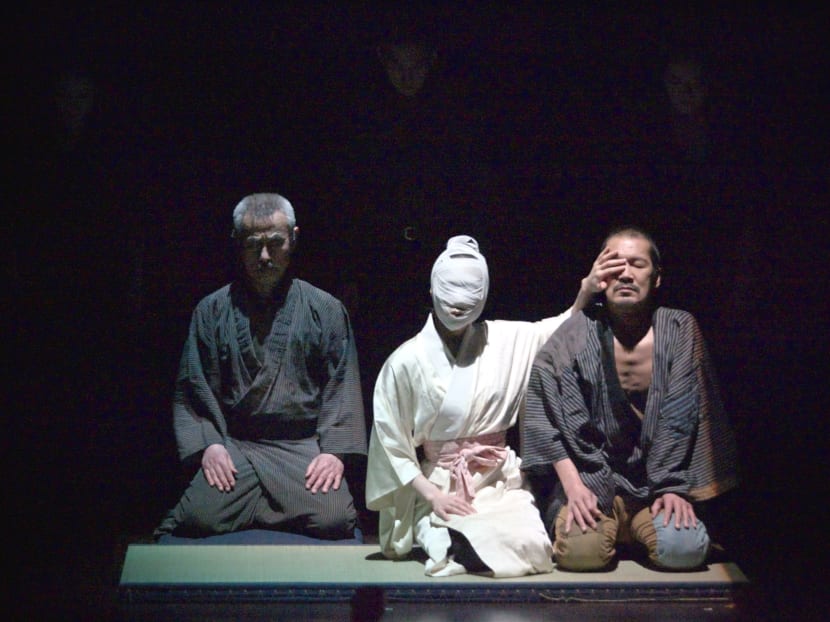Shun-kin | 4.5/5
SINGAPORE — On a stage wrapped in shadows, at times illuminated only by candlelight, Shun-kin is an exquisite invitation to embrace the darkness. And we’re thoroughly mesmerised.

Simon McBurney's Shun-kin. Photo: Tsukasa Aoki
SINGAPORE — On a stage wrapped in shadows, at times illuminated only by candlelight, Shun-kin is an exquisite invitation to embrace the darkness. And we’re thoroughly mesmerised.
Directed by Complicite’s Simon McBurney in collaboration with Setagaya Public Theatre, it’s the first show under the highly anticipated 3 Titans Of Theatre series by Singapore Repertory Theatre and The Esplanade.
Based on Japanese author Junichiro Tanizaki’s fiction piece A Portrait Of Shunkin and his more philosophical essay In Praise Of Shadows, it explores the love story between a female shamisen instructor and her manservant.
An incident leaves Shun-kin blind from a very young age. Sasuke, who’s slightly older, is smitten and from then on remains at her beck and call right until the end. It all sounds sweet, except that their relationship is strongly feudal and sadomasochistic — the privileged Shun-kin asserting her dominance over a more-than-willing Sasuke, who goes to great and tragic lengths to keep her satisfied and happy. In one scene, she kicks Sasuke (who has a toothache) in the face, again and again as he screams in pain. Shaped as choreography so hypnotic, it’s as beautiful as it is disturbing—one of the wince-worthy but compelling moments the play has to offer.
And yet, for all that power over one man, Shun-kin’s disability and status as a woman in old Japan makes her vulnerable as well.
So she needs him, they do have and enjoy sex, but she mocks his social status and scoffs at the idea of marrying someone beneath her (erm, no pun intended). It’s a very complicated relationship, indeed.
McBurney heightens the unconventional situation of Shun-kin the person with the fascinating use of bunraku puppetry to portray her as a young girl and a young woman before actress Eri Fukatsu takes over. It’s effective not so much in the sense that you “forget” the presence of the puppeteers but that their presence feels completely justified. She is, after all, blind and in need of assistance.
But we know that Shun-kin is no pushover either — the image of a puppet young girl bullying or a puppet young woman demanding to have sex with real-life actor Songha as the younger Sasuke in a way perversely reveals the latter’s own helplessness.
That the play is about ways of seeing is perhaps the most obvious thrust. The constant interplay between shadow and light onstage gives you the sensation of of groping through a kind of “moral” darkness. And of course, the ingenious use of sticks and tatami mats, the flipping between old school and high tech props (video projections, pieces of paper as birds) also makes it all look stunning.
But the bedrock on which Shun-kin sits is the idea of listening — that which is heightened when, as was the case with our main tragic character, sight is taken from her. Not just in the presence of a live musician playing the shamisen (Honjoh Hidetaro) but in its very structure.
We are, essentially, listening to multiple storytellers. Before he gets into character as the old Sasuke, actor Yoshi Oida offers a personal anecdote about being born on the same year Tanizaki wrote the texts. When the play proper begins, we listen to a man reading from a book about Shun-kin. And then there is the recurring modern day thread of a radio — not TV — narrator (Ryoko Tateishi) who’s recording the story of Shun-kin, the light-hearted, funny element that offers audiences the occasional breather in what would otherwise be an intense two hours.
A haunting night spent in the morally ambiguous world of Shun-kin proves that, to paraphrase that cheeky perverse saying, once it all goes black you never go back.
Shun-kin has two more shows today, 3pm and 8pm, Esplanade Theatre. With a 3pm matinee on Sat. Tickets from S$38 to S$108 at Sistic.







